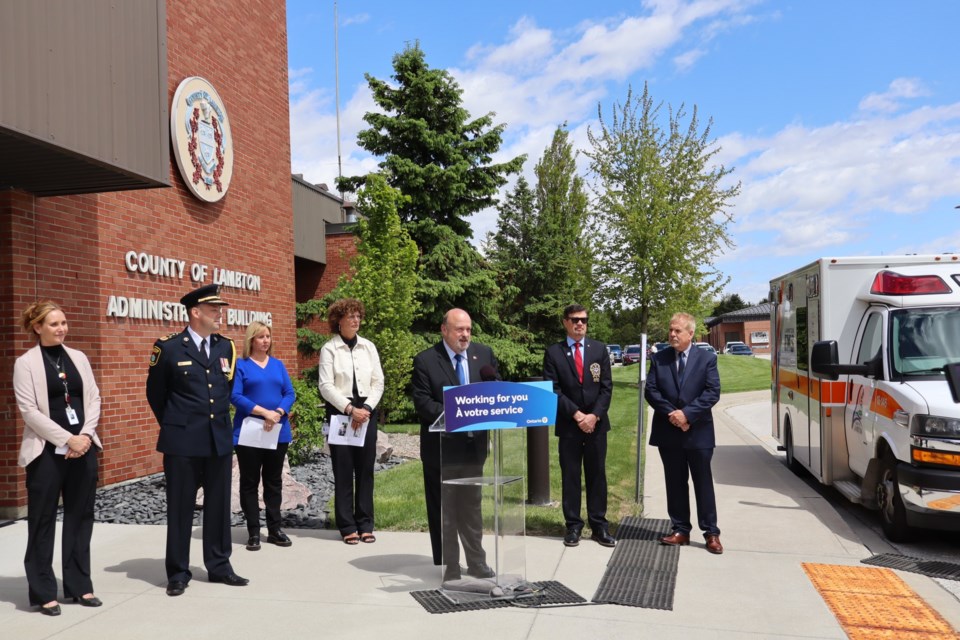The Community Health Integrated Care Pilot (CHIC) team in Lambton County has been operating since June, funded by a $2.5 million provincial government grant spread over three years.
The mobile crisis response team aims to provide easier access to support for individuals experiencing homelessness, mental health crises, and/or addiction.
Associate Minister of Mental Health and Addictions, Michael Tibollo, said in a release that the “government is funding innovative programs like this one in Lambton County as a critical step to filling gaps in mental health and addictions care, addressing the surge in demand for substance use services and helping ensure vulnerable people connect to high-quality care where and when they need it.”
Every day, a two-member team—one Lambton EMS paramedic and one substance use navigator from Bluewater Health—travels the county from 10 a.m. to 10 p.m.
“We are the only outreach team that works seven days a week,” says Anita Trusler, Crisis System Navigation Manager, Lambton EMS.
“There are other outreach teams through the County of Lambton Homelessness Prevention team, North Lambton Community Health Centre does outreach, harm reduction outreach in the community, but nobody else is doing it on Saturday and Sunday.”
Their work includes on-scene interventions, de-escalation, referrals to treatment, mental health supports, housing assistance, connections to primary care providers, access to withdrawal management beds, wound care, wellness checks, and harm reduction supplies such as warming, cooling, and infection control resources.
“Up until the end of September, 777 neighbour engagements occurred between June 7th and September 30th,” says Trusler.
This figure does not represent 777 unique individuals. This number also includes multiple visits to some of the same people with complex needs or anyone who approaches the team looking for water, snacks, or supplies, which they also provide.
Like the CHIC program, the hiring process for a group like this was unique.
“We needed to make sure that we found people that could make a connection that understood the complexities. Especially of addictions and homelessness and poverty, basically the social determinants of health,” explains Paramedic Chief and Manager of Lambton County EMS Steve Turner.
“Our interview process was very much based on that and we looked for those kinds of skills,” Turner adds.
The county also made sure applicants knew this wouldn’t be a easy job and could be mentally taxing.
“We were looking for an aptitude specifically for this kind of work,” says Turner.
“And we had a lot of interest and as we interviewed through people you could see that they were genuinely concerned, and they wanted to do high impact work. It was a change of pace from what they do on the 9-1-1 side of things, and it was a chance for them to develop themselves too, so it was a kind of neat collaboration.”
The group underwent four weeks of training, covering topics such as homelessness, addiction, first aid, and reducing stigma when working with vulnerable individuals.
“Our tool is to make sure that they're resourced, to be able to do the incredible work that they can do and to ensure that we're also ensuring their safety, and that we can avoid burnout because, as Steve said, it can be difficult work,” adds Trusler.
Trusler explains it’s a small but mighty CHIC team. Currently, there are four EMS staff, two of which are full time, alongside five substance use navigators who rotate through the schedule alongside their work at Bluewater Health.
Of the $2.5 million allocated over three years, a large portion funds staffing costs—wages and benefits—for the nine team members, along with support from a manager (Trusler) and a part-time data lead/epidemiologist.
Another significant portion of the funding goes toward outreach supplies, including medical resources, food, snacks, socks, sleeping bags, and transportation supports like taxi services and bus tickets.
“On the 911 side, you don't typically build a relationship with your patients because the focus is to stabilize them as best as you can and get them to where they need to be, which is typically the hospital. It's usually a shorter-term engagement,” says Trusler.
She adds, “but for us, we're seeing repeated people over and over again, and you have that relationship, so you can spend the time with them.”
“911 is episodic, and CHIC is more longitudinal,” Turner concludes.
